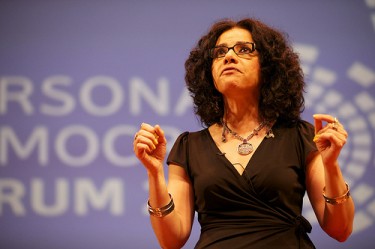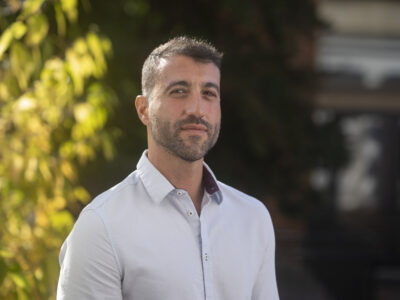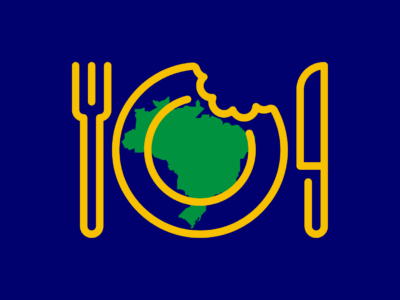[Todos os links levam para páginas em inglês.]
A colunista egípcia-americana Mona Eltahawy causou mais uma vez polêmica com um artigo na revista Foreign Policy, intitulado “Por que eles nos odeiam?”, em 23 de abril de 2012. A matéria fala sobre a discriminação contra as mulheres no Oriente Médio. Eltahawy argumenta que as sociedades árabes são fundamentalmente misóginas e que os abusos s fim contra as mulheres acontecem “alimentados por uma mistura tóxica de cultura e religião”.
Muitos jornalistas árabes, blogueiros e ativistas criticaram a maneira que Eltahawy estruturou os seus argumentos e expressaram raiva diante das imagens que acompanham o artigo, de uma mulher nua com o corpo pintado de preto semelhante a um niqab, argumentando que estas são representações estereotipadas das mulheres árabes.
A Foreign Policy, desde então, publicou respostas de cinco comentaristas.
Eltahawy escreve no artigo:
Some may ask why I'm bringing this up now, at a time when the region has risen up, fueled not by the usual hatred of America and Israel but by a common demand for freedom. After all, shouldn't everyone get basic rights first, before women demand special treatment? And what does gender, or for that matter, sex, have to do with the Arab Spring? But I'm not talking about sex hidden away in dark corners and closed bedrooms. An entire political and economic system – one that treats half of humanity like animals – must be destroyed along with the other more obvious tyrannies choking off the region from its future. Until the rage shifts from the oppressors in our presidential palaces to the oppressors on our streets and in our homes, our revolution has not even begun.
Em um post intitulado “Mona: Por que você nos odeia?”, o ativista e blogueiro egípcio Gigi Ibrahim escreve:
The fundamental problem of Mona’s essay is the context and framework of how she analyzes why women in the Middle East are oppressed and the only reason she could give is because men and Arab societies (culturally and religiously) hate women. This is offensive to most women I know, who read the article and shared the same view. Women in the Middle East are not oppressed by men out of male dominance, they are oppressed by regimes (who happened to be men in power) and systems of exploitation (which exploit based on class not gender). Having women in power in a flawed system will not “fix” the problem either. We had a women’s quota in Mubarak’s parliament, did that change anything for women in reality? It was all ink on paper. Even after revolution, women are consistently used for political grounds by crony political parties. Explaining why women are oppressed without touching on any of the historical, political, or economical aspects of Arab countries, which are not all the same as she tends to generalize in her article, couldn’t be more delusional than this piece.
Hafsa Halawa no Egito não é completamente contra o artigo:
@Hhafoos: Whilst I disagree w her tone & I certainly don't agree w pictures used, there are facts in Mona Eltahawy's article we can't ignore anymore
A jornalista palestina, nascida na Síria, Dima Khatib discorda através do post em seu blog, “Amor, não o ódio, cara Mona!”:
We are not weak, Mona, and the Arab revolutions have proved to us that we are stronger than we thought, and the heroines of the Arab revolutions don’t need to be pointed out. I don’t think we need saviors from the hatred and vengeance of our men, especially since the revolutions have proved that we are more than able to stand shoulder to shoulder with men to achieve progress for our societies. Your article paints a picture of the Arab society that matches the images of the article: black, bleak, depressing, a painted black body. You have reduced the problem of the Arab woman to the feelings of men; while she was reduced to pathetic images which perfectly represent the images the West have of her. […] Arab society is not as barbaric as you present it in the article, which enhances the stereotype of us in the reader's mind, and it is a stereotype which is frighteningly widespread, and contributes to the widening cultural rift between our society and other societies, and the increase of racism towards us.
A jornalista líbano-americana e blogueira Roqayah Chamseddine comentou o assunto em um post intitulado “Nós e eles: mulheres indefesas e o imaginário orientalista”:
Not only has Eltahawy demonized the men of the Middle East and confined them into one role, that of eternal tormentors, as her Western audience claps and cheers, she has not provided a way forward for these men. Are they eternally damned? Is this their own manifest destiny, one which has been predetermined at the point of conception? Do they have no way out of the sweeping accusation which brands them as natural haters of women? What of male feminists, are they forever struggling against their innate urge to hate women? Mona Eltahawy has penned both men and women into a non-negotiable situation, charging men with hatred and women with helplessness; and as a woman of colour, of Middle Eastern origin, I will not allow my voice to be co-opted. Mona Eltahawy may be one of us, but she is not “us” nor does she define us.
O ativista egípcio de direitos humanos Hossam Bahgat twitou:
@hossambahgat: “Muslims hate their women” is no different from “Muslims are essentially violent”. what a great disservice to our fight
Em um post intitulado “Eu realmente não acho que eles nos odeiam!”, a professora assistente de jornalismo Nahed Eltantawy referiu-se “as poderosas mulheres árabes da Primavera Árabe”:
When I look at these Arab heroines, who have made their people proud, I don't see hate. I see love, compassion and understanding between young men and women who are willing to work together to create better lives, more freedoms and more just governments for everyone. So, to Eltahawy, I say that your column does not represent me as I don't feel hated. I do have concerns, which might be similar or different to my sisters in Egypt. But I'm confident that whatever social, cultural, political and economic problems I personally face, these are challenges that can be fought instead of simply blaming them on misogyny.
Ayesha Kazmi, que bloga como American Paki, ficou decepcionada com a maneira que o artigo de Eltahawy “espetacularmente fragmenta o feminismo”:
To claim that the “real war on women is in the Middle East” stakes the legitimacy of Arab women in the war against women, that I view as a global phenomenon not unique to Arab women, while leaving millions of non-Arab women, also victims of systemic misogyny, to fend for themselves. Mona has dangerously isolated non-Arab women from a war that is global. If Mona wanted to specifically address the plight of Arab women, she should have done so without appropriating the entire war as uniquely her own. Take the greater Muslim world for example, could she honestly look an Afghani or Pakistani woman in the eyes and read the title of this piece to them without recoiling?
A estudiosa do Oriente Médio baseada nos Estados Unidos Shadi Hamid comentou:
@shadihamid: Whatever you think abt @monaeltahawy's piece, says a lot that the very ppl she's trying to “liberate” seem to mostly disagree w her.







